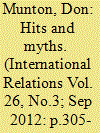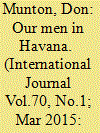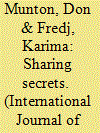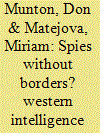| Srl | Item |
| 1 |
ID:
117429


|
|
|
|
|
| Publication |
2012.
|
| Summary/Abstract |
Graham Allison's Essence of Decision: Explaining the Cuban Missile Crisis is recognized more for its general decision-making models than for its historical analysis. The second (1999) edition, co-authored with Philip Zelikow, adopts the same basic models and answers the same three 'central puzzles' of the missile crisis: (1) why did the USSR deploy nuclear missiles to Cuba; (2) why did the United States blockade Cuba; and (3) why did the USSR withdraw its missiles? This review article questions the answers Allison and Zelikow provide to each of these questions. In particular, I discuss the importance of the partially secret Khrushchev-Kennedy agreement as a factor in ending the crisis and present new evidence suggesting that Turkey may not, as usually assumed, have been opposed at the time of the crisis to decommissioning its US Jupiter missiles. I also suggest some additional missile crisis questions beyond the three 'central puzzles'.
|
|
|
|
|
|
|
|
|
|
|
|
|
|
|
|
| 2 |
ID:
087541


|
|
|
|
|
| Publication |
2009.
|
| Summary/Abstract |
At the behest of Washington, Canadian diplomats secretly gathered intelligence in Cuba during the 1960s, sometimes in collaboration with British counterparts. They did so despite the lack of a Canadian foreign intelligence tradition and despite the fact that Canada maintained diplomatic and trade relations with the Castro government, often in the face of American criticism. The intelligence studies literature does not much explore such examples of intelligence cooperation let alone provide much basis for theorizing. The present article attempts to explain this case using both realist theory and liberal-constructivist theory. Canada's cooperation can be explained in part by Cold War-related security concerns and in part by a desire to meet the norm of quid pro quo that permeates international intelligence liaison.
|
|
|
|
|
|
|
|
|
|
|
|
|
|
|
|
| 3 |
ID:
137139


|
|
|
|
|
| Summary/Abstract |
Diplomats based at the Canadian embassy in Havana conducted extensive foreign intelligence operations in Fidel Castro’s Cuba from the early 1960s through the early 1970s. They collected human intelligence of both a political and military nature, using covert as well as overt means. They did so generally at the behest of the United States, and undertook specific “tasked” operations on request from the State Department and the US intelligence community. The diplomat-spies also collaborated operationally with United Kingdom personnel. This article represents the first detailed survey of the Cuba operations and attempts to place Canada’s foreign intelligence program in the context of its relations with the United States and of Canadian foreign policy generally.
|
|
|
|
|
|
|
|
|
|
|
|
|
|
|
|
| 4 |
ID:
004519


|
|
|
|
|
| Publication |
Ottawa, Canadian Institute for International Peace and Security, 1988.
|
| Description |
116p.
|
| Series |
CIIPS Working Paper; no.14
|
| Standard Number |
0662166140
|
|
|
|
|
|
|
|
|
|
|
|
Copies: C:1/I:0,R:0,Q:0
Circulation
| Accession# | Call# | Current Location | Status | Policy | Location |
| 030484 | 327.174/DRI 030484 | Main | On Shelf | General | |
|
|
|
|
| 5 |
ID:
124000


|
|
|
|
|
| Publication |
2013.
|
| Summary/Abstract |
During the lead-up to the 2003 invasion of Iraq, the governments of the United States and United Kingdom jointly made public a range of previously secret intelligence to bolster claims that Saddam Hussein's regime had continued to pursue development of weapons of mass destruction. Public releases of intelligence information are less rare than often assumed, but the Iraq case was definitely unusual in that both governments implicitly revealed their close cooperation.
|
|
|
|
|
|
|
|
|
|
|
|
|
|
|
|
| 6 |
ID:
116168


|
|
|
|
|
| Publication |
2012.
|
| Summary/Abstract |
Iran's Islamic Revolution and the takeover of the United States embassy in Tehran in November 1979 was America's and the West's first encounter with contemporary radical Islam. It prompted substantial intelligence cooperation amongst Western countries. Their liaison included not only the collection of human intelligence (Humint) but also an effort to protect six Americans who had escaped becoming hostages, and then a successful covert exfiltration operation to secure their escape from Iran. Canadian embassy staff, assisted by CIA experts, mounted this operation in late January 1980. We use the Iranian Revolution and occupation of the American embassy in Tehran both to flesh out the nature of contemporary Western Humint cooperation and to highlight the intelligence activities, including international intelligence liaison, of Western foreign ministries.
|
|
|
|
|
|
|
|
|
|
|
|
|
|
|
|